😈 The curious case of Albrecht Bluome
Designer's notes on Caveat Emptor and incentivizing players to choose the "tougher" prompts in solo journaling games. Also, Tumulus Issue 4 is shipping now to new and existing subscribers.
I was so surprised and thrilled to see that Beyond Solitaire picked up a copy of Caveat Emptor at Gen Con and did an overview video!
If you’ve ever been curious about solo TTRPGs in general or Caveat Emptor specifically, it’s a really good overview of both. It’s good to see a board gamer’s perspective on this type of game. My goal has always been to make games that appeal equally to “TTRPG players” as they do “board game players” because I think the line between those two groups is blurrier than one might think.
Liz mentioned a few things that I thought were interesting and wanted to share.
The curious case of Albrecht Bluome
During the demo, Liz drew cards to generate a customer and a few possible items to curse. The customer was Albrecht Bluome, a cartographer. Although he has traveled more than most, it is never enough. The items included a magic city map, a box of fingers to curse enemies, and a thought-reading brass lantern.
Which one would you choose?
Well, the obvious choice is the map, right? Of all the customers and items, that one just seems perfect! Give poor, unsuspecting Albrecht a map showing hidden portals in the city and twist it with a curse that subtly tortures him.
Done! Record the sale and give yourself a pat on your demon back.
Encouraging tougher prompts
One of the things I wanted to play with in Caveat Emptor was incentivizing the player to choose “harder” prompts — ones that were a little more difficult to think through.
In my experience, most solo TTRPGs I’ve played provide me with a single prompt and I respond to it. This could be in the form of drawing a playing card and looking up the prompt, rolling dice and piecing together some words, or a combination of the two. In those cases, the player agency comes from how we respond to the prompt rather than the selection of it. This is how games like You are a Muffin work, and you could even argue that such games have zero player agency.
In Caveat Emptor, I wanted to give the player multiple prompts and ways to respond. The player draws a card for a customer and then draws three cards for possible items to curse. That adds one layer of player agency — the choice of which item to curse.
Next, the player needs to choose how to curse the item using one of three types: Degree, Cost, or Pedantic. Using a specific curse type moves a token on a track, increasing suspicion and reducing the dice pool size for the next time it is used. This incentivizes using different kinds of curses each time and responding to the items in different ways.1
The addition of vexation points
Vexation points (VP) didn’t exist in the one-page version of the game and were added into the full zine edition.2 Success at the end of the game depends on a number of successful sales and a number of VP gained.
My thought was that I could push the incentive a little more by adding a point system to the game. If players are offered three possible items to curse, they will naturally choose the easiest one — the one that they can readily think of a way to sell and/or curse.
That makes sense, but I wanted to offer an incentive to pick something that didn’t immediately make sense. I wanted players to see the map but think, “Hrm… but if I could sell this other item, I’ll get more points.”
Again, I wanted to see how far I could push (encourage?) players to choose prompts that seemed less obvious and challenged their imagination more. The cursed map is the easy choice, but the points might get players to at least consider the others.3
Play the game you want
Liz did choose the map, resulting in a perfect sale, good story, but zero points… and I love that! The curse types and points are meant as a way to encourage thinking about other options, but they aren’t hard rules. When a desperate cartographer walks into the shop and you have a dangerous map for sale, you sell the map. That’s the right answer, regardless of points!
Also, it is correctly pointed out that the ability to sell the item without being “caught” relies on a die roll. Dice pools start at 3d6 on the first and will drop as low as a 1d6 after a few uses. A failed sale results in customer cards being discarded and pushes the player a little closer to losing the game. This might force you to close the shop for the day and reset the pools for the next day.
Liz made a house rule to allow herself the occasional re-roll if the story being told really should have closed the deal. Why lose a sale just from a bad dice roll?
I love this too. Ultimately, games like Caveat Emptor are toys that we put out into the world. The intent is to have people play with them, not just “play them” by following strict rules. If throwing in an occasional re-roll helps achieve the kind of fun you want, then by all means add it!
The whole point of the game is to have fun.
ABC… Always Be Cursing
I was excited to see a game I designed played by someone in the gaming community that I respect so much. I’ve followed Liz and the Beyond Solitaire channel for a long time and I’m looking forward to Night Witches next year.4
If you’d like to curse some items, Caveat Emptor is available in print and as PDF.
Tumulus 04. Return to the sea.
Just a heads up that all copies of Tumulus Issue 4 have shipped to subscribers. You should receive a shipping notification with tracking information. If you don’t see it, please check your spam folders.
This issue includes contributions from Nate Whittington and Junk Food Games. It’s packed with other nautical curiosities as well, including a pirate island generator, a discussion of maximalist submarine games, and more. Design exercises included.
New subscribers will receive Issue 4 as their first of four, quarterly issues at a discount. A limited number of back issues are also available at full list price.
Any questions, send me an email at games@exeunt.press.
Thanks for subscribing to Exeunt Omnes! Check out games.exeunt.press for all the latest games and resources!
- E.P. 💀
Left to my own devices, I would always pick Pedantic curses. Those are the best.
I thought finding a name for them that matched VP (victory points) was quite clever… or at least I thought it was amusing.
To be clear, there is no “wrong” choice here. The goal is to encourage the consideration of other items and prompts, not to dictate which ones should be chosen.
According to BGG, Night Witches is “a solitaire or two-player cooperative game in which the Night Witches–female pilots of the Soviet 588th Night Bomber Regiment–work together to fly harassment missions on the Eastern Front during WWII.” The two designers are Liz Davidson and David Thompson with art by Ian O’Toole. This would be an instant purchase for me.

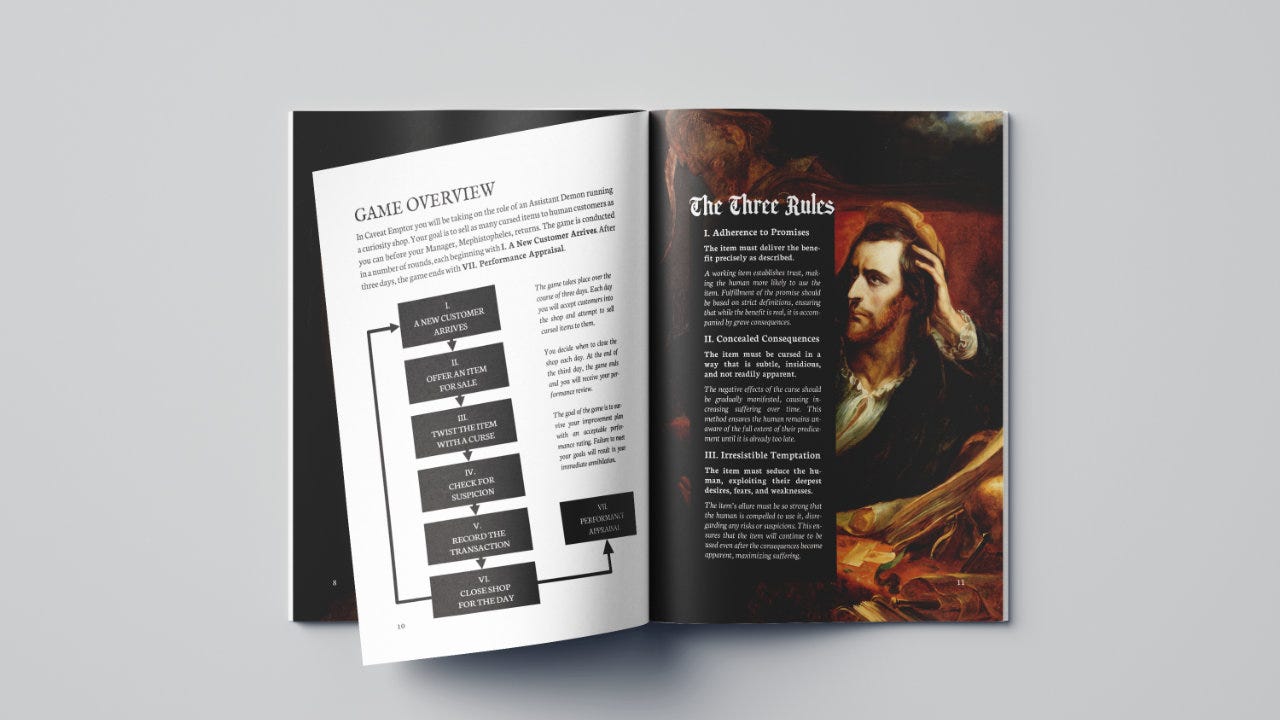
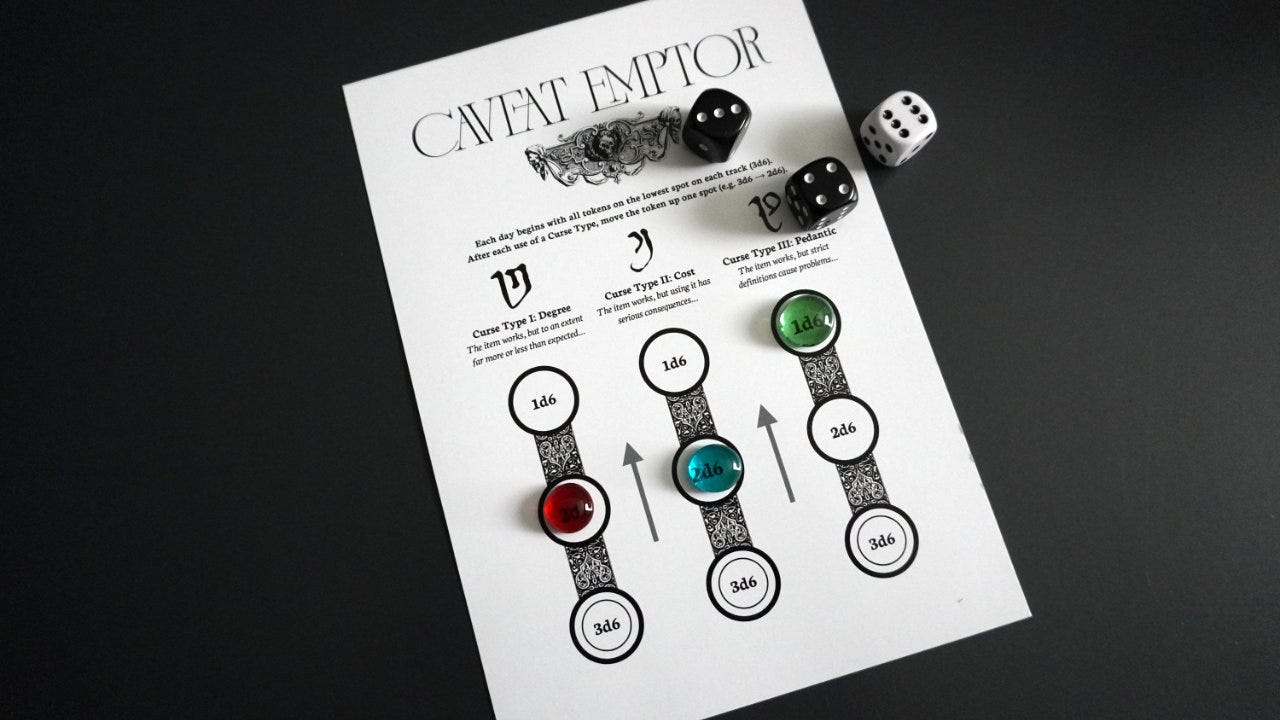
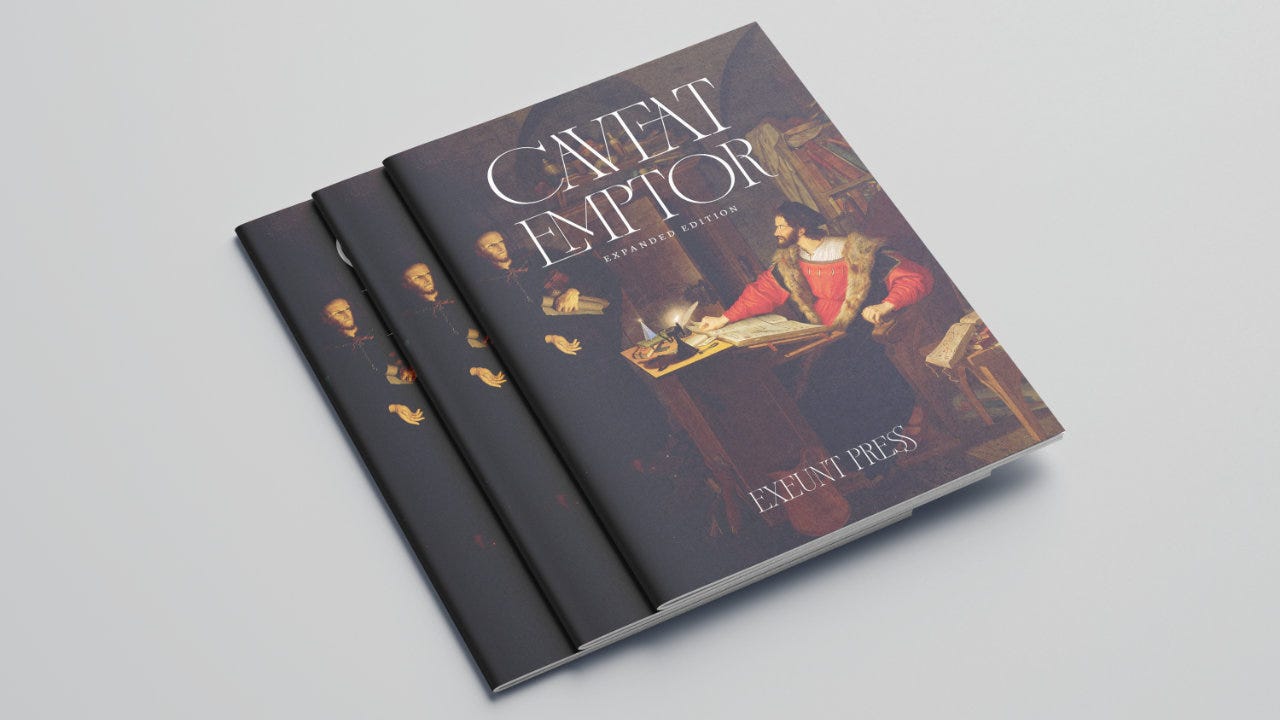
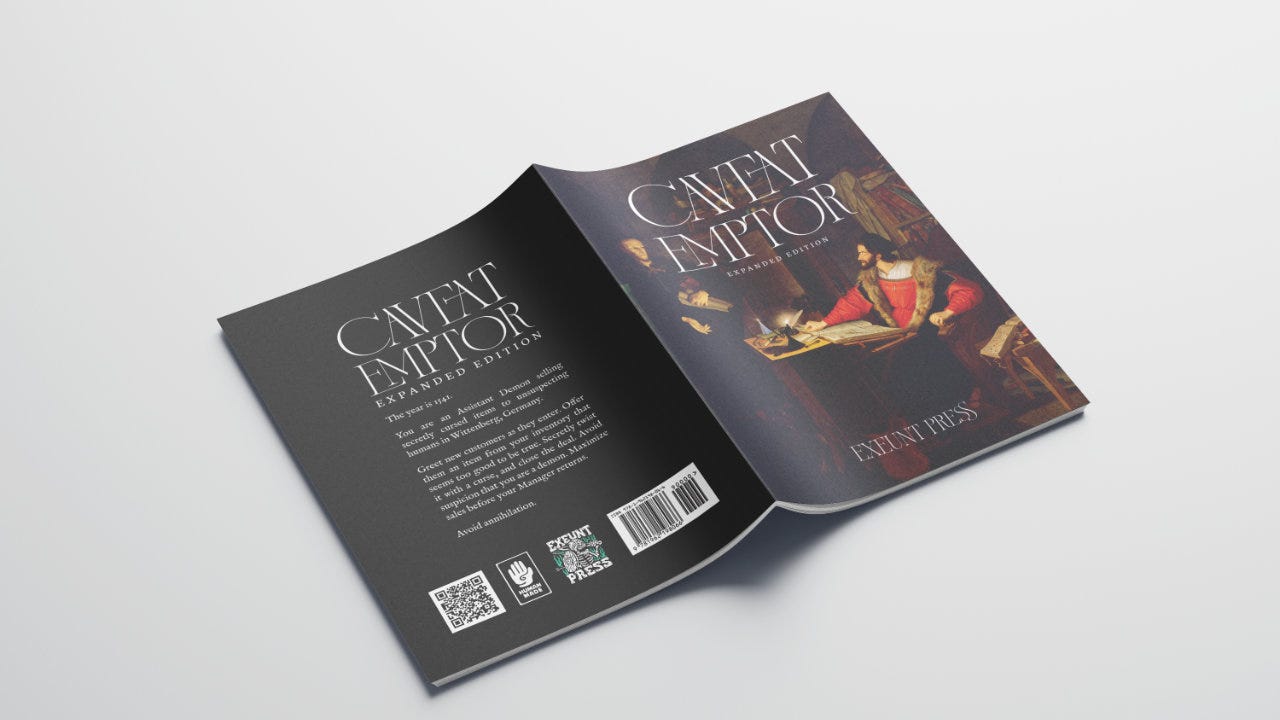
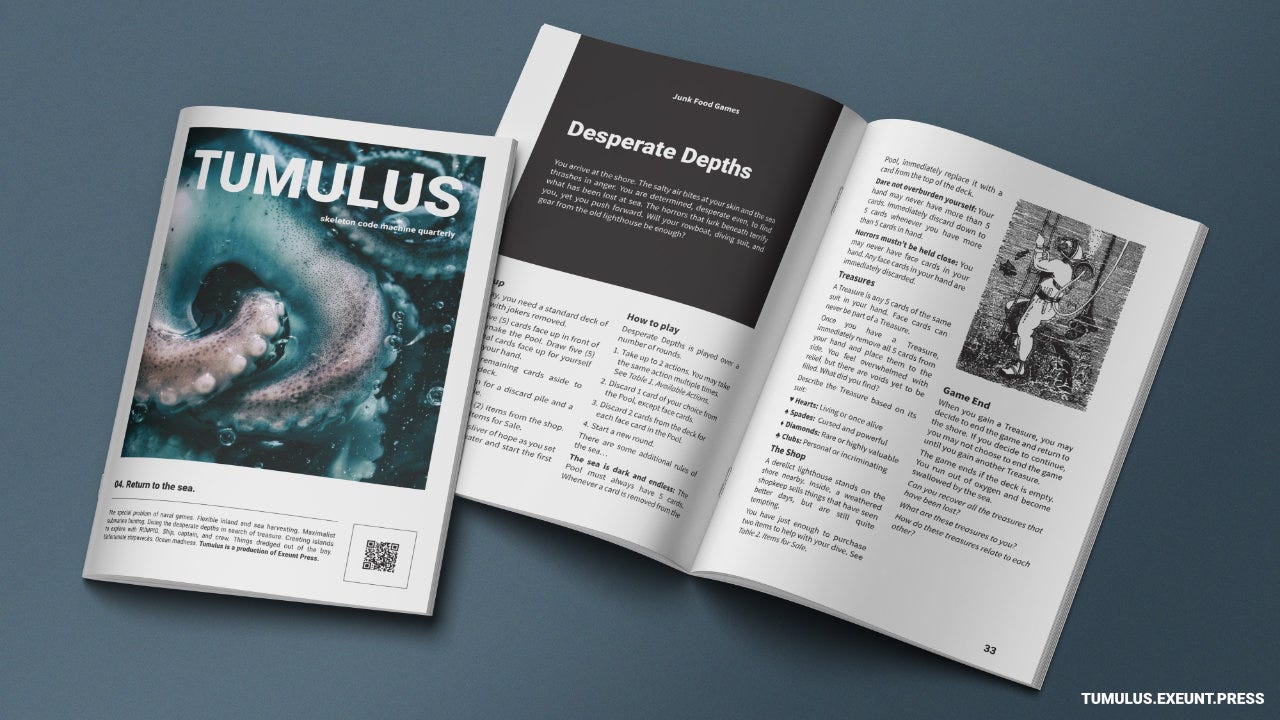
I need to finish my writeup of Caveat Emptor but so much work, so little time 🤯